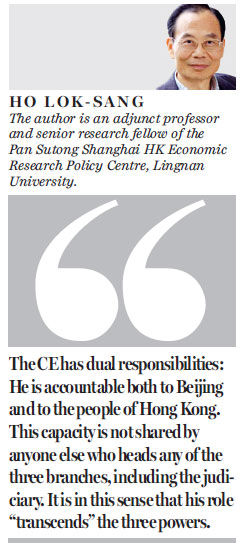The controversy on the separation of powers stems from imprecise language
Updated: 2015-09-30 09:48
By Ho Lok-sang(HK Edition)
|
|||||||
It is unfortunate that some statements made by Zhang Xiaoming, director of the Liaison Office of the Central People's Government in the HKSAR, caused such a stir, not for the substance of what he said but for the rhetoric. Like the white paper issued by the State Council last year, The Practice of the "One Country, Two Systems" Policy in the Hong Kong Special Administrative Region, what was said substantively was construed to be something else - something that could add ammunition to the fire of distrust over the intent and commitment of Beijing to uphold the "One Country, Two Systems" framework in Hong Kong.
Neither Zhang nor the white paper ever disputed the independence of the judiciary, and indeed they explicitly asserted its independence. No one is above the law, notwithstanding the unique and extraordinary role assigned to the Chief Executive in an executive-led setting. However, some commentators chose to put words in Zhang's mouth and said that, according to him, the CE would be like a super-monarch and above the law.
What Zhang actually says is that Hong Kong practices an executive-led system with the CE at the core. "The political system of the SAR is a system for local administration; the Chief Executive is at the core of the political system; the power of the executive relative to the legislative (branch) is one of leadership; the power of the executive and the power of the legislative (branch) is one of mutually constraining and mutually cooperating - while maintaining judicial independence."
Zhang further explained that the CE is not only the head of the executive branch of the government but also the head of the entire SAR government. This unique role is not enjoyed by anyone else. It is only in this sense that he is "above" all the branches of the government. Indeed in the words of Zhang, the CE is at the core of power in the SAR, below the central government and above the three powers serving the role of a "hub" or bridge.
The CE has dual responsibilities: He is accountable both to Beijing and to the people of Hong Kong. This capacity is not shared by anyone else who heads any of the three branches, including the judiciary. It is in this sense that his role "transcends" the three powers, because he plays the role of a hub, a bridge if you will, between Beijing and the SAR.
Zhang said that there has never been sanquan fenli (separation of powers) in Hong Kong - not prior to the handover, and not after. In saying this, it is clear that he meant Hong Kong after the handover of sovereignty is no different from Hong Kong before the handover as far as the three powers are concerned.
For the Hong Kong public, this begs the question of exactly what he did mean.
To me, the problem lies in the imprecise use of language. In English, separation of powers means that the powers are separate from one another, meaning that they are exercised independently. But in Chinese, the word fenli could mean "independently established", where li means jianli; alternatively fenli could just mean "separate", or duli. Zhang never refuted the independent operation of the three branches of government. He wanted to emphasize that the three powers were not independently established for separate purposes but that they work together for a common purpose. This is furthering the interests of Hong Kong - the duty delegated to the CE when he is appointed. Because the three powers are supposed to work together for a common purpose, "mutually cooperating" makes sense even though they operate independently.
It is unfortunate that some of our media play into the hands of those politicians seeking to take advantage of Zhang's statement to cause a stir. Pro-opposition activist Martin Lee Chu-ming had this to say: "It is really mysterious. It's not at all clear how Zhang could argue like this. Does he intend to create a superman in the SAR? If the CE were to be above the three powers, that would mean he would not need to steer clear of corruption while government officials have to (That would mean) He could free himself of the consequences after killing people! Is this the case?"
Actually, separation of powers as a way to check power abuses is a great innovation. But separation of powers must be for a social purpose, and all branches of the government need to remember the common social purpose. Even on the mainland, gradually establishing the independence of the judiciary is an ambition explicitly spelled out in the Fourth Plenum of the 18th Communist Party of China Central Committee. China is not against independence of the judiciary, but does not, at least as yet, endorse a regime in which the three branches of government are formed separately through separate elections. For the SAR, the separation of powers as a way to check against power abuses has not been challenged, and indeed is upheld both by the white paper and by Zhang's speech.

(HK Edition 09/30/2015 page10)